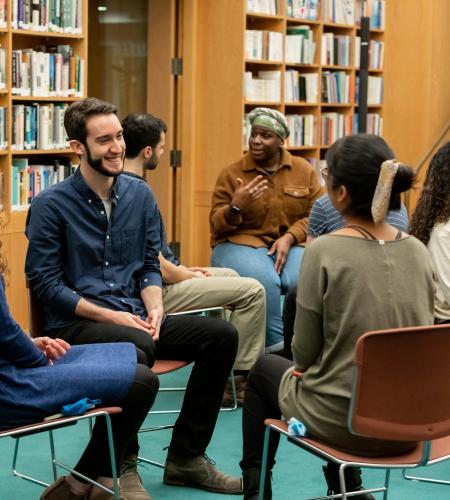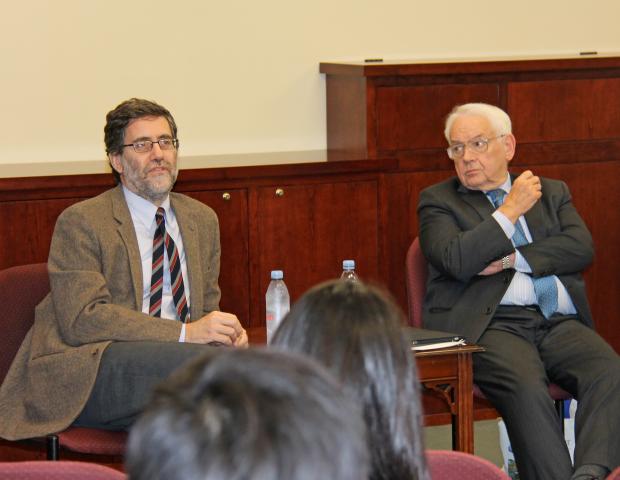George Mason University (GMU) outside of Washington D.C. in Fairfax, Virginia, is an educational institution with a strong presence of currently active military service men and women, as well as veterans of the U.S. armed services. This made it an ideal venue for the seminar, held October 17, 2013, and co-sponsored by the Ikeda Center and GMU, which explored the theme, “Global Citizenship and Cultural Assumptions About Peace and the Military.” In this report, Mitch Bogen summarizes key findings from the discussion.
: :
In brief introductory remarks, Center director Richard Yoshimachi explained that the seminar’s purpose was to “bring the thoughts of established scholars” into dialogue with current undergraduate and graduate students, whom he described as “the next generation of scholars, activists, and researchers.” And he cited Daisaku Ikeda’s recent twentieth anniversary message to the Center. “It is up to us to choose dialogue over violence,” wrote Mr. Ikeda. “More than two decades after the end of the Cold War, our world continues to be riven with conflicts propelled by unbroken cycles of hatred and violence. But no matter how dire the situation may appear, we must never abandon our faith in dialogue.”
On hand to share their insights with students were GMU provost and scholar of modern social history Peter Stearns and Seton Hall University’s Dean of the School of Diplomacy and International Relations, Andrea Bartoli. The more than two-dozen students in attendance included a creative mix of individuals with and without military connections. GMU’s Dean of Visual and Performing Arts, William Reeder, moderated the 90-minute discussion. As preparation for the seminar, participants read two of Daisaku Ikeda’s university lectures, both of which addressed matters of global citizenship and human security, as they will play out in the twenty-first century.*
Opening Reflections
In his opening statement, Dr. Stearns made four observations about U.S. culture that drew upon his recent research and writing on the day’s topic. First, he noted that, “to a surprising extent,” the United States actually has an “impressive and persistent” tradition of peace-related research and endeavor, including even a 1793 proposal by Benjamin Rush to establish a US Department of Peace. Less encouraging, said the Provost, is the fact that ours is, quite simply, a militaristic culture. The U.S. alone spends more than 40 percent of the world’s military budget he said. Further, he feared that we are becoming “habituated to frequent war.”
His third point was at once hopeful and ambivalent. Our recent debate about a proper course of action in Syria revealed that the American people are fatigued with war. This is a good thing, said Dr. Stearns, but clarified that this is not the same as “a commitment to peace.” We must seize this “transitory moment,” he said, “to help Americans think more deeply about peace.” Finally, he said we would do well to accept Daisaku Ikeda’s invitation to develop new levels and modes of compassion and empathy, as well as a greater sense of our global interconnection.
In his opening comments, Dr. Bartoli meditated upon the unique value of dialogue. Words spoken in person, in dialogue, have a special power, he said. In his view, “something beautiful” happens when one person is present to speak and another is present to receive what is said. Citing the maxim that “truth needs two people,” Professor Bartoli emphasized that we need environments where this special kind of communication can take place. Such places weaken violent impulses, since violence occurs when parties feel that they cannot be understood. Unlike the space of dialogue, where we acknowledge that we are fragile and always changing and learning, violence is a place of “no options.”
For Bartoli, the American university is a place where “we can be in each other’s presence lovingly, curiously, and respectfully.” “Don’t take for granted how we make each other through words,” he said, because “in many places it is not even possible or safe to disagree” as we are able to do in our institutions of higher education. What is true in our culture at its best is not necessarily true of other cultures.
Dean Reeder chose to focus his opening remarks on ways his “personal journey” has informed his understanding of war and our responses to it. He knows well the pain of war, he said, because he was just a young boy when his father was killed in WWII. Soon after the war, when America was entering into the Cold War, a teacher in his “one room country schoolhouse in Kansas” asked students to write an essay on how they would serve their country. Reeder said that although “patriotic” essays were expected, he chose not to say he would join the army, or something else along those lines, but that he would teach people to play the flute! As it turned out, he did build a life and career in the arts. Along the way he learned that the artists are free to enter “a dimension where your actions aren’t dictated by your heritage or environment.”
How Can We Make a Difference?
After these opening thoughts from the panelists, the rest of the seminar was devoted to whole group dialogue. The first student to speak was a young woman who built on Dean Reeder’s remarks and got right to the heart of the matter, which is the question of what we can actually do to “foster more peaceful communities.” She felt confident in her ability to make a difference among her friends and classmates, she said, and planned to make a difference going forward as a teacher. But she felt less confident in her ability to make a difference on “a larger scale,” with our dysfunctional Congress being one example of how citizens can be made to feel powerless.
Bartoli responded by saying that her path might be one in which “you could be a student today, a teacher tomorrow, and a president after that.” More specifically, he urged everyone to understand the “power of the listener.” A recent example is how Vladimir Putin seized upon an offhand comment in John Kerry’s remarks on the chemical weapons situation in Syria to suggest a way forward not even intended by the Secretary of State. When we are “engaged and attentive” we can “create new possibilities,” he said.
The next topic was introduced by a student who wondered if internal change, or what Daisaku Ikeda calls “human revolution,” is needed among our leaders if progress toward peace is to happen. The emergence of Rouhani in Iran, she said, shows how much difference an individual can make. Provost Stearns agreed, and said that we “know from history” of many “personal conversions” in which leaders and others “transfer their courage from conventional military settings to the more challenging process of taking risks on behalf of peace.” He added that a good example close to home is the organization Veterans for Peace.
Another significant theme emerged when a student remarked on the process of “truth-telling testimony” in Argentina that has helped that nation move beyond the oppression of the military junta that resulted in nearly 10,000 people “disappearing” at the hands of the state from 1976 to 1983. Bartoli agreed that this is an important strategy for creating more peaceful nations, but noted that is a process that must be handled with “great delicacy.”
He identified the challenge as twofold. Sometimes “if you have been traumatized you may not want to tell any truth,” and “that is your right.” As an example, he shared the story of a boy who was made to watch his family be killed by paramilitary forces and then ordered to tell his village that this same fate might await them. The boy was never able to speak of it, said Bartoli, who only learned of it years later from the boy’s grandmother. How many others face such horrible circumstances today, he wondered. The other challenge is finding a way to tell the truth effectively, said Professor Bartoli. Provost Stearns agreed, saying that an important question to ask of truth commissions is whether the goal is forgiveness or “a legalistic conception of justice.”
Some Military Perspectives
Critically, the presence of military veterans ensured that the discussion would be grounded in concrete experiences of war and military endeavor. The veterans who spoke demonstrated that there is not just one military experience or perspective. Here are some key themes:
- One young Marine Corp vet, now a graduate student at GMU, raised a tough question based on his experience in Afghanistan. While there he encountered people who “had been demonized,” yet who simply wanted to live in a “self-sufficient” manner without placing demands on others. Yet, as far as he could tell, the “infinite expansion” of the global system of market-based capitalism was placing tremendous, unending demands on them. Was there any way, he wondered, to counteract this intrusive trend? Bartoli remarked that, on the whole, he believed the “free exchange of goods and ideas has benefited human lives.” To mitigate the negative impact of markets we need to draw on the only truly infinite capacity, he said, which is “the capacity for creativity.”
- Another Marine Corps vet contended that “we can’t escape conflict, but conflict does not preclude dialogue.” In his view there are ways of waging war that are wrong, and that some wars are worse than others. The key, he suggested, is to remove emotion from the situation whenever possible. This way we can better resist the allure of violence when violence is imminent and wage war more wisely when in the field. Provost Stearns questioned whether emotion could truly be removed, but made the related point that we have a tendency to demand absolute victory once a war has started, when the true goal should be the cessation of fighting.
- One veteran touched on cultural misunderstandings of the military. Because of the all-volunteer military, he said, most citizens don’t understand the sacrifices and hardships demanded by the military life. Nor do people understand the extent to which “the military is highly transformational,” adapting quite well to technological and social changes. His own endeavors include the creation of an art project that will create grassroots communication across these communities. A former member of the Navy echoed those remarks, saying that most Americans don’t understand the extent of the humanitarian work being performed by US Armed Services. He himself was involved with ships that functioned as hospitals in Central America.
At the close of the dialogue, Provost Stearns expressed his gratitude for the diverse questions and insights of all the participants, many of whom said they would like the discussion to continue. The openness and shared commitment to global well being of all involved made tangible Daisaku Ikeda’s conviction, also cited by Mr. Yoshimachi in his introductory remarks, that “dialogue is a choice that we make for peace, for life, and for humankind’s sustainable future.”
* The lectures were “Thoughts on Education for Global Citizenship (delivered at Columbia University, Teachers College, 1996) and “Peace and Human Security: A Buddhist Perspective for the Twenty-first Century” (delivered at the East-West Center, Hawaii, 1995). Both are published in A New Humanism: The University Addresses of Daisaku Ikeda (London: I. B. Tauris & Co. Ltd., 2010).

